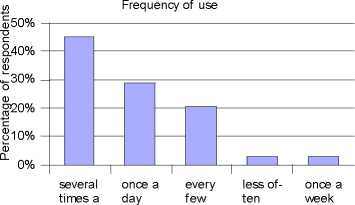Provided by University of Birmingham Research Archive, E-prints Repository
News Not Noise: Socially Aware Information Filtering
Jonathan Melhuish
Advanced Interaction Group
School of Computer Science
University of Birmingham
Edgbaston, Birmingham
B15 2TT, UK
+44 (0) 121 414 3744
[email protected]
Russell Beale
Advanced Interaction Group
School of Computer Science
University of Birmingham
Edgbaston, Birmingham
B15 2TT, UK
+44 (0) 121 414 3729
ABSTRACT
An understanding of how people in social networks consume
news media by and about their friends shows that information
overload is soon going to be a major problem for many
participants. Users dislike manually prioritizing their
friendships to help organize this data, and this leads us to
develop a new interface to help users to find the news that most
interests them by providing a visual representation of social
proximity, in which friends most visited and those most likely
to be met offline we prioritized.
Categories and Subject Descriptors
J.4 [Computer Applications]: Social and Behavioral Sciences
- psychology. H 5.2 [User Interfaces]: Prototyping. Screen
Design, User-Centred Design
Keywords
Social networks, Facebook usage, information overload
1. INTRODUCTION
Online social networking services have dramatically risen in
popularity in recent years, particularly amongst younger people
[6]. These services facilitate multi-modal communication
amongst users by making it easy to discover material created by
friends and also to create, upload and publish content. This
content may be textual, visual, or multimedia or may be another
form of interaction between users such as playing a game.
Brief exploration of the user profiles on a social networking
service reveals that these relationships are not only varied but
vast in number. Many users seem to have several hundred
“friends” in their online social network. Talking to users
quickly reveals that it is quite unusual to ever delete a friend
from one's online social network, so this number will
presumably grow ad infinitum. Social psychology tells us that
an individual's number of meaningful relationships stays
relatively constant and small (around 20). This implies that a
large proportion of the “friends” on the average social
networking service's profile are more accurately acquaintances
with which the user has no significant social bond, meaning that
he may make little effort to maintain the relationship.
If this is indeed the case, then users will soon start to suffer
from information overload, if they do not do so already. With
many contacts, each producing news, the quantity of
information flooding in to an individual will soon become
unmanageable. In order to gain an understanding of this, we
undertook a survey of Facebook users to understand more about
© The Author 2008.
Published by the British Computer Society
their online relationships and how they consumed the media
that their friends produce.
2. FACEBOOK SURVEY
A survey was sent to a set of ‘friends’ on Facebook, who are a
varied collection of people - undergraduates, postgraduates,
peers, family, and so on. There are related surveys by Joinson
[5] and Ellison et al. [3], though our aim was not to undertake a
massive survey of people, but to gain more insightful, deeper
responses from a more limited set. The results are discussed
below. Where a correlation between two variables is given, this
indicates that a Pearson Correlation was found with a
significance level of at least 0.05. In the case of comparisons
between the ratings given to different categories, the Wilcoxon
Signed Rank Test was used. As multiple hypotheses (pair-wise
comparisons) were being tested, the probability of finding a
hypothesis to be true by chance is increased. A higher
significance threshold of 0.01 was used to compensate for this.
The data were analysed using SPSS. 148 of one of the author's
Facebook friends were asked to participate in the study, of
whom precisely half responded. There were slightly more male
respondents (58%). The average age was 24, with a sharp peak
around 22 (the first author's age). The standard deviation was
5.23 (to 3 s.f.).
Usage
Almost half (45%) of respondents reported logging into
Facebook several times a day. Only 5% of respondents logged
into Facebook less often than “every few days”. Note,
however, that the invitation to participate in the survey was sent
via Facebook, so those who log in less frequently may feel less
compelled to respond.

day
days
Figure 1: Frequency of Facebook logins
One respondent commented that the frequency of his usage
varies dramatically:
“Ask me a month ago and I was on several time a day and
updating my status all the time. Now I update status once a
week! and don't even log on every day.”
A large majority of respondents (86%) logged in for half an
hour or less per session. The average reported session duration
was 23 minutes, with a median of 15 minutes and a standard
deviation of 22.7.
115
More intriguing information
1. Wirkung einer Feiertagsbereinigung des Länderfinanzausgleichs: eine empirische Analyse des deutschen Finanzausgleichs2. Constructing the Phylomemetic Tree Case of Study: Indonesian Tradition-Inspired Buildings
3. Explaining Growth in Dutch Agriculture: Prices, Public R&D, and Technological Change
4. Keystone sector methodology:network analysis comparative study
5. The name is absent
6. Ventas callejeras y espacio público: efectos sobre el comercio de Bogotá
7. AGRICULTURAL TRADE LIBERALIZATION UNDER NAFTA: REPORTING ON THE REPORT CARD
8. The name is absent
9. DIVERSITY OF RURAL PLACES - TEXAS
10. The effect of classroom diversity on tolerance and participation in England, Sweden and Germany